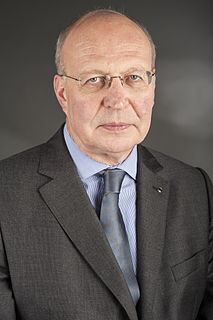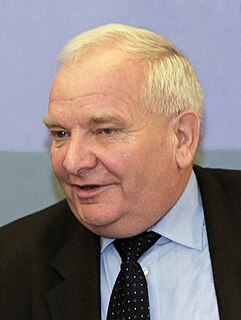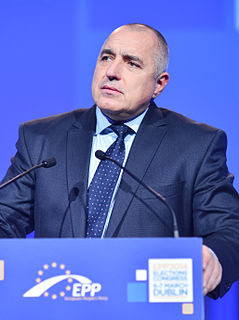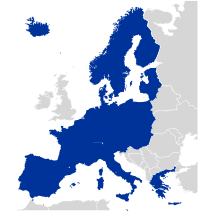
The European Parliament (EP) is one of three legislative branches of the European Union and one of its seven institutions. Together with the Council of the European Union, it adopts European legislation, commonly on the proposal of the European Commission. The Parliament is composed of 705 members (MEPs). It represents the second-largest democratic electorate in the world and the largest trans-national democratic electorate in the world.

A Member of the European Parliament (MEP) is a person who has been elected to serve as a popular representative in the European Parliament.

The 2004 European Parliament election was held between 10 and 13 June 2004 in the 25 member states of the European Union, using varying election days according to local custom. The European Parliamental parties could not be voted for, but elected national parties aggregated in European Parliamental parties after the elections.

Andrew Nicholas Duff, OBE is a British politician who presided over the Union of European Federalists (UEF) from 2008 to 2013. A member of the Liberal Democrats, he served as a Member of the European Parliament (MEP) for the East of England from 1999 to 2014.

The Movement for Rights and Freedoms is a centrist political party in Bulgaria with a support base among ethnic minority communities.
This is a list giving breakdowns of the members serving in the European Parliamentary session from 2004 to 2009, following the 2004 election. For a full single list, see: List of members of the European Parliament 2004–2009.

Elections to the European Parliament take place every five years by universal adult suffrage, and with more than 400 million people eligible to vote, they are considered the second largest democratic elections in the world after India's.
The Barroso Commission was the European Commission in office from 22 November 2004 until 31 October 2014. Its president was José Manuel Barroso, who presided over 27 other commissioners. On 16 September 2009 Barroso was re-elected by the European Parliament for a further five years and his Commission was approved to take office on 9 February 2010.

Romania elects on a national level a head of state – the president – and a legislature. The president is elected for a five-year term by the people. The Romanian Parliament has two chambers. The Chamber of Deputies has currently 330 members, elected for a four-year term by party-list proportional representation on closed lists. The Senate has currently 136 members, elected for a four-year term by party-list proportional representation on closed lists.

The apportionment of seats within the European Parliament to each member state of the European Union is set out by the EU treaties. According to European Union treaties, the distribution of seats is "degressively proportional" to the population of the member states, with negotiations and agreements between member states playing a role. Thus the allocation of seats is not strictly proportional to the size of a state's population, nor does it reflect any other automatically triggered or fixed mathematical formula. The process can be compared to the composition of the electoral college used to elect the President of the United States of America in that, pro rata, the smaller state received more places in the electoral college than the more populous states.

The 2009 European Parliament election was held in the 27 member states of the European Union (EU) between 4 and 7 June 2009. A total of 736 Members of the European Parliament (MEPs) were elected to represent some 500 million Europeans, making these the biggest trans-national elections in history. An additional 18 observers were pre-elected.

Identity, Tradition, Sovereignty was a far-right political group in the European Parliament which was composed of 23 MEPs from European parties during the 6th term. A common political charter for the group was signed on 9 January 2007, and the group was formally recognized by Parliamentary president Josep Borrell at the start of the EP plenary session on 15 January. Following remarks made by ITS member Alessandra Mussolini that Romanian ITS members found insulting, the Greater Romania Party (PRM) withdrew from the group, thus disqualifying it as an official group. Hence, it formally ceased to exist on 14 November 2007.

Bulgaria elected its members of the European Parliament in a by-election on 20 May 2007. It was the country's first European election, having joined the Union on 1 January of that year. The country still had 18 MEPs, no change from before the election. Until Bulgaria could hold these elections, the country was represented by MEPs appointed by the National Assembly.

The 2009 European Parliament election in Bulgaria was held on Sunday 7 June 2009 and was the election of the delegation from Bulgaria to the European Parliament. As a result of the Treaty of Nice – that became active in November 2004 – the number of Bulgarian delegates in the European Parliament decreased from 18 to 17 delegates. When the Treaty of Lisbon was ratified, the number of Bulgarian Delegates increased to 18 again.

The Sixth European Parliament was the sixth five-year term of the elected European Parliament. It began on Tuesday 20 July 2004 in Strasbourg following the 2004 elections and ended after the 2009 elections.

The European Conservatives and Reformists (ECR) is a soft Eurosceptic, anti-federalist political group of the European Parliament. The ECR is the parliamentary group of the European Conservatives and Reformists Party European political party (formerly known as the Alliance of Conservatives and Reformists in Europe or Alliance of European Conservatives and Reformists, but also includes MEPs from four other European parties and thirteen MEPs without European party affiliation.

On 1 January 2007, Bulgaria and Romania became member states of the European Union (EU) in the fifth wave of EU enlargement.

The history of the European Union from 2004 to the present is the current timeline of the European union. It is a period of significant upheaval and reform following the 2004 enlargement of the European Union. The EU has taken on ten new members, eight of which were initially much poorer than the EU average, and took in a further two in 2007 with many more on the way. It created the euro a few years before and had to expand this, and the Schengen Area to its new members. However this was overshadowed by the late-2000s recession and damaging disputes over the European Constitution and its successor, the Treaty of Lisbon. Throughout this period, the European People's Party has been the largest group in the European Parliament and provides every President of the European Commission.

The 2014 European Parliament election in Bulgaria was held on 25 May 2014 to elect the Members of the European Parliament from Bulgaria to the European Parliament as part of the larger European Parliament election. After a decision by the European Council in 2013, Bulgaria was allocated 17 seats in the European Parliament for the Eighth European Parliament.

The 9th European Parliament was elected in the 2019 elections and is to last until the 2024 elections.





















